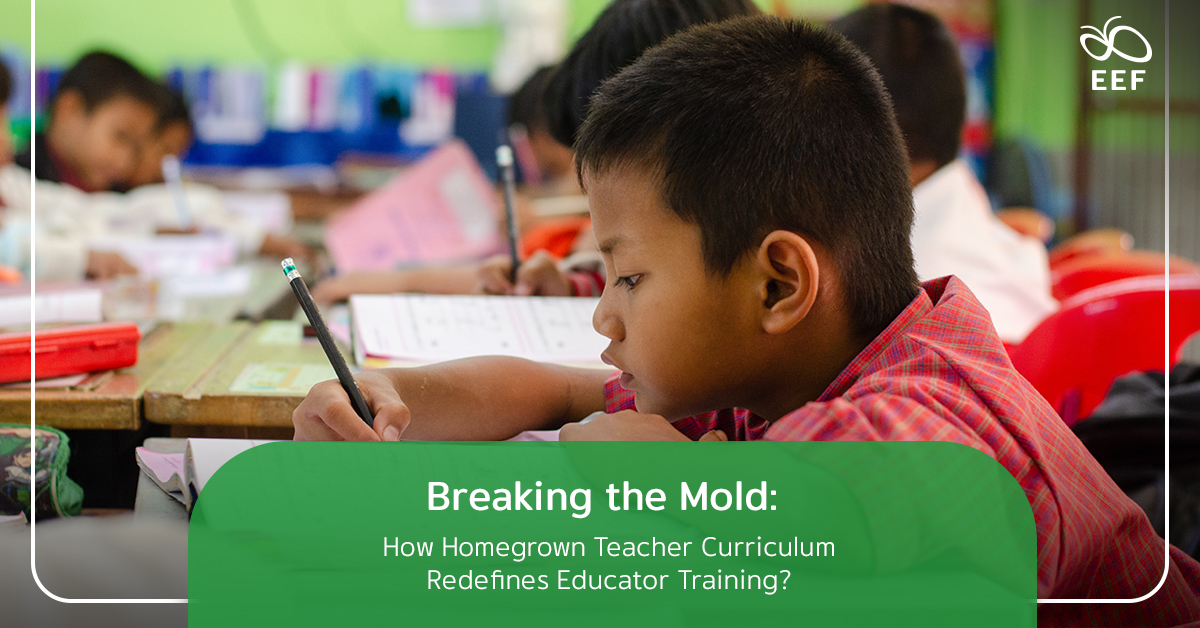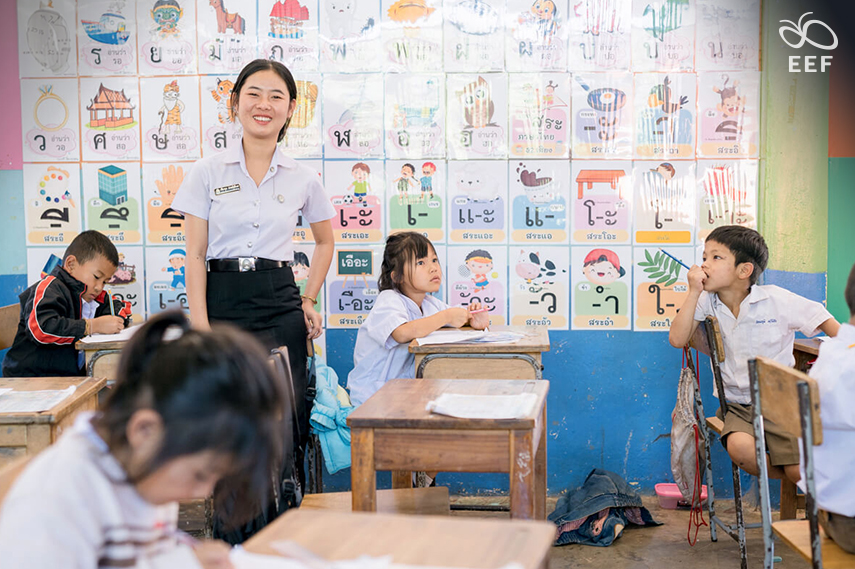
The Homegrown Teacher initiative spearheads the selection of candidates from local communities to assume teaching roles in their respective areas, fostering sustainable educational development. This concerted endeavor enlists the support of key stakeholders, including the Equitable Education Fund (EEF) Thailand for partnership rallying, the Ministry of Education (MOE) for policy-making, the Ministry of Higher Education, Science, Research and Innovation (MHESI) for teacher training, and the Office of the Basic Education Commission (OBEC) for teacher deployment. By pinpointing areas where upcoming retirements are expected within the next four years, the initiative strategically focuses on placing teachers in small, remote schools. In doing so, priority is accorded to financially disadvantaged students from these areas, who are selected for Homegrown Teacher scholarships. Training of these future educators takes place in designated higher education institutions, ensuring that students receive instruction in their own localities and subsequently serve their communities upon completion. This holistic approach not only nurtures local talent but also adeptly caters to the distinctive needs of each community.

The choice for teacher-students to pursue education in their own localities is driven by a desire to cultivate educators deeply rooted in their communities. These educators, fueled by authentic passion and a commitment to teaching and developing their hometowns, assume a dual role as both teachers and catalysts for community progress. Central to this endeavor is the collective engagement of community members in nurturing the growth of children — a pivotal element for fostering resilience within communities and advancing national development. Embracing the educational framework of small community schools facilitates the pursuit of diverse aspirations, whether they involve career advancement or higher education, and crucial to this transformative process are regional institutions, with their rich experience in community development, offering invaluable insights and expertise.
The process of identifying suitable candidates for scholarships involves university professors venturing into local communities to seek out prospective students. They immerse themselves in the children’s environment, engage with parents, and gain insights into the communities’ ways of life. This approach differs significantly from traditional scholarship programs as it prioritizes candidates from financially disadvantaged backgrounds. The aim is not to recruit academically gifted individuals but rather those with potential and a genuine desire to become teachers. Collaboration among university faculty members is crucial in conducting outreach activities and selecting candidates. The rigorous selection process ensures that the invested resources yield promising candidates who are likely to complete their studies and return to serve as teachers in their communities, marking the pivotal beginning of this transformative journey.

The curricula for Homegrown Teacher students are distinct from those of general teacher education programs; they adhere to the standards set by the MHESI, and universities undergo a rigorous selection process to ensure the quality of programs. A key aspect distinguishing those curricula is the requirement for students to reside in university dormitories, which necessitates collaboration with various university faculties and administrative bodies to provide holistic support. Unlike traditional programs, Homegrown Teacher students, in addition to traditional curricula, undergo enrichment programs and receive personalized attention to adapt to university life and develop essential life skills. Additionally, the curricula emphasize community engagement and special education training to prepare teachers for diverse challenges. Overall, it is an all-encompassing approach that equips Homegrown Teacher students with the knowledge, skills and competencies, and attitudes necessary to serve as educators and community developers effectively.
Furthermore, the Homegrown Teacher initiative requires each scholarship recipient to undertake an individual project, linking them to their future teaching destinations. These projects involve field research aimed at gaining insights into community needs. Concurrently, efforts are underway to bolster the capacity of destination schools and offer training opportunities for scholarship recipients; school administrators and educational experts play an active role in assessing schools and providing necessary guidance. Recipients undergo training at their future schools during semester breaks and commence preparations for recruitment, subsequent to successfully passing certification exams and English proficiency tests. Moreover, a support system is established to ensure sustained improvement in destination schools post-graduation and to enable teachers to sustain themselves for a minimum of six years. Ultimately, the initiative seeks to revolutionize teacher education, fostering the development of high-quality teachers aligned with national objectives.

In addressing the multifaceted role of local teachers, it’s crucial to recognize that they extend beyond the confines of the classroom to become community educators. The essence of national development lies in fostering resilient communities, wherein children are integrated, not isolated. Thus, empowering communities becomes paramount, ensuring quality education permeates urban and rural areas alike. However, to reduce disparities and uplift educational standards, the focus must shift to schools. Only by revitalizing the teaching force can meaningful educational reforms be achieved.

While standardized curricula have historically dominated educational systems, recognizing and addressing diverse learning needs is essential for genuine progress in education. Empowering teachers to adapt, innovate, and connect with their students on a deeper level is paramount, as they play a pivotal role in driving positive change within their communities. By investing in the professional development and support of local educators, we unlock the potential for transformative impacts that resonate far beyond the confines of the classroom. Education, therefore, becomes not just a means of imparting knowledge but a catalyst for shaping the collective mindset and outlook of entire communities. Each investment made in teachers represents an investment in the future, as they guide and inspire students to navigate the intricacies of the ever-evolving contemporary world with resilience and determination. As we continue to prioritize and invest in education, we not only transform individual lives but also empower entire communities to thrive, adapt, and flourish in an ever-changing world.

